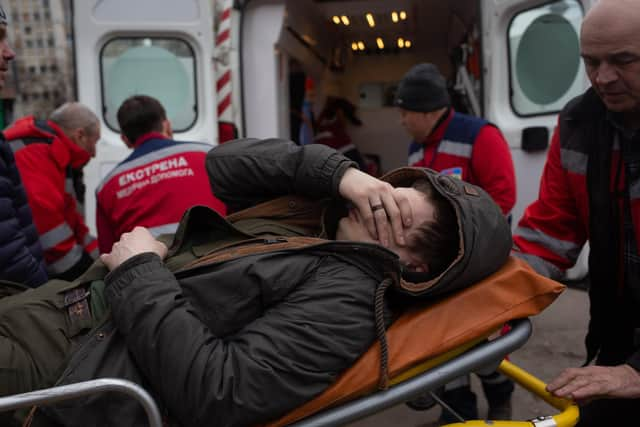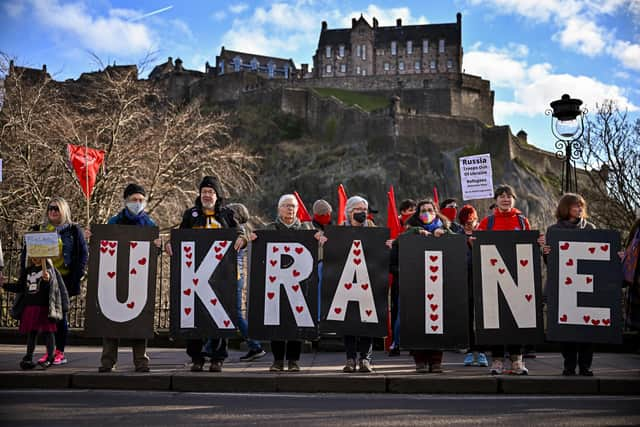Ukraine-Russia war: Civilians killed as Russia accused of breaking ceasefire and targeting populated areas
The mother, teenage son and a daughter who appeared around eight years old were killed after a shell landed in a street in Irpin, leaving the father severely wounded but alive and being tended to by Ukrainian forces.
The family were among hundreds of civilians attempting to flee to Kyiv, as Russian troops attempt to push through Irpin and other small towns to the north-west of the capital.
Advertisement
Hide AdAdvertisement
Hide AdIt comes as bids to evacuate 200,000 civilians from the besieged city of Mariupol in the south of the country failed for a second time.


Over 1.5 million people have now fled Ukraine for neighbouring countries in the fastest-growing refugee crisis since the second world war, the head of the UN refugee agency Filippo Grandi said.
First Minister Nicola Sturgeon said there is a “desperate need” for the UK to step up in supporting refugees, labelling current efforts “just not good enough” after the Home Office admitted that only 50 visas had been granted under the Ukraine Family Scheme despite over 5,000 applications.
Hundreds of people gathered at a protest against the conflict in Edinburgh on Sunday, forming a “human chain” along the pavements.


Mariupol city council accused Russian forces of continued shelling despite a ceasefire meant to last until evening, preventing a convoy of evacuees from leaving the city.
Ukrainian ambassador to the UK Vadym Prystaiko called Russian troops “animals” for breaking the ceasefire.
“Human lives [have] been shelled by the Russians as they tried to escape,” he said.
A similar evacuation plan was halted on Saturday.
Russia’s bombardment of the city for the previous week has been so heavy emergency services have not been able to collect the bodies of those killed, and survivors are sheltering in basements, Maripol mayor Vadym Boichenko told Reuters news agency on Saturday.
Advertisement
Hide AdAdvertisement
Hide AdIn an update on Sunday, the Ministry of Defence (MoD) said Russian forces were targeting populated areas in Ukraine.
“The scale and strength of Ukrainian resistance continues to surprise Russia. It has responded by targeting populated areas in multiple locations, including Kharkiv, Chernihiv and Mariupol,” the MoD said.
“This is likely to represent an effort to break Ukrainian morale. Russia has previously used similar tactics in Chechnya in 1999 and Syria in 2016, employing both air and ground-based munitions.
“Russian supply lines reportedly continue to be targeted, slowing the rate of advance of their ground forces. There is a realistic possibility that Russia is now attempting to conceal fuel trucks as regular support trucks to minimise losses.”
Russia has denied it is targeting civilian areas.
Prime Minister Boris Johnson warned in an article published by the New York Times that “even darker days” may lie ahead in the conflict.
“Have we done enough for Ukraine? The honest answer is no,” he wrote, setting out a six-point plan to tackle Russian President Vladimir Putin’s advance.
Mr Johnson called on leaders to mobilise an “international humanitarian coalition” for Ukraine and support the country “in its efforts to provide for its own self-defence”.
Economic pressure on the Kremlin should be increased, he said, and leaders must resist the “creeping normalisation” of what Russia is doing in Ukraine.
Advertisement
Hide AdAdvertisement
Hide Ad“We have failed to learn the lessons of Russian behaviour that have led to this point,” he wrote.
“No-one can say we were not warned: we saw what Russia did in Georgia in 2008, Ukraine in 2014 and even on the streets of the British city of Salisbury. And I know from speaking to my counterparts on recent visits to Poland and Estonia just how acutely they feel the threat.”
Mr Johnson discussed his plans with Ukrainian President Volodymyr Zelensky in a phone call on Sunday afternoon, where he said “the British people stand fully behind the Ukrainian people”.
Shadow defence secretary John Healey said the Prime Minister must match his rhetoric with action.
He said: “In many ways, some of our allies could reasonably turn around and say ‘well it’s all very well for you, Boris Johnson, but you’ve got to now match some of your tough rhetoric with your own action, particularly on humanitarian assistance, on diplomacy and on sanctions’.”
Only around 50 UK visas have been granted to Ukrainian refugees as part of the Ukraine Family Scheme, the Home Office said, despite 5,535 online applications and a further 2,368 people booking appointments to submit applications and biometric information.
Home secretary Priti Patel insisted the UK is “doing everything possible” to speed up efforts to approve visas.
She said during a visit to the Ukrainian Social Club in Holland Park in London : “Let’s be clear, this is the first scheme in the world that’s up and running in this short period of time.
Advertisement
Hide AdAdvertisement
Hide Ad“Ten thousand applications and yes, grants are happening as we stand here right now and are speaking. So I’m surging staff across all application centres across the entire European Union as well as in the border countries such as Poland, where I was the other day and obviously where huge numbers of people are coming through.”
The Home Secretary denied accusations from France that refugees had been turned away from the UK at Calais.
French interior minister Gerald Darmanin on Sunday said it was “inhumane” of the UK to turn away refugees arriving at the French port city if they did not have a valid visa.
But Ms Patel said: “Let me just correct what has been said by the French government. The British Government is not turning anybody around or turning anybody back at all.
“And I think it’s really important to emphasise that, particularly at this time, when all nations across Europe must work together to help and support people in need and fleeing Ukraine at this awful, awful time.”
Earlier, Mr Darmanin told Europe 1 radio: “I called my British counterpart twice.
“I asked her to set up a consulate in Calais that can process people’s paperwork and issue visas.”
Hundreds of Ukrainian refugees in Calais have been told by British authorities to obtain a visa at UK consulates in Paris or Brussels, Mr Darmanin said, calling it “a bit inhumane” to expect them to travel all the way there after their long journeys from Ukraine.
Advertisement
Hide AdAdvertisement
Hide Ad“The British must put their rhetoric into action, I’ve heard the big words of generosity from Mr (Boris) Johnson,” Mr Darmanin said.
“I hope this will allow the English to open their arms a little and stop the technocratic nit-picking”.
Meanwhile, US Secretary of State Antony Blinken said the US and allies were in “very active discussion” about banning the import of Russian oil and gas as part of sanctions on the country.
Around three per cent of crude shipments to the US come from Russia, while in Europe the figure is estimated at 30 per cent for oil and 39 per cent for gas.
Mr Blinken told CNN: “We are now talking to our European partners and allies to look in a coordinated way at the prospect of banning the import of Russian oil while making sure that there is still an appropriate supply of oil on world market,” said Blinken.
“That’s a very active discussion as we speak.”
A message from the Editor:
Thank you for reading this article. We're more reliant on your support than ever as the shift in consumer habits brought about by coronavirus impacts our advertisers.
If you haven't already, please consider supporting our trusted, fact-checked journalism by taking out a digital subscription.
Comments
Want to join the conversation? Please or to comment on this article.
